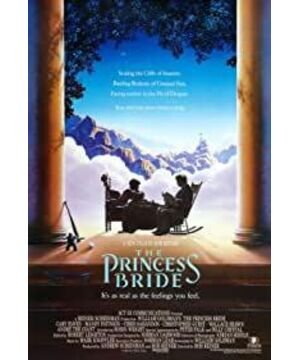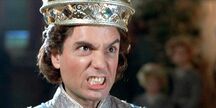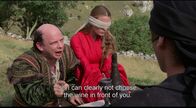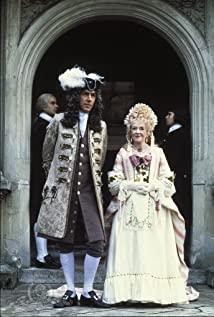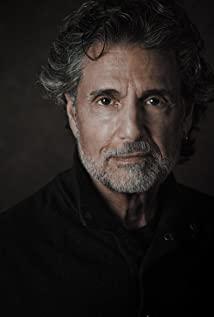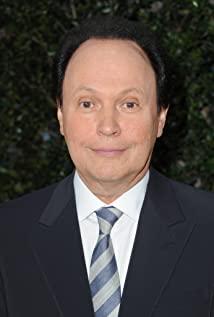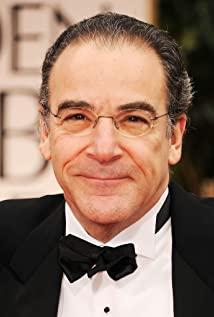I. Introduction
Negotiations are everywhere, whether at work, in life, or in fairy tales. In this paper, I analyze the movie Princess Bride from the perspective of negotiations and draw some lessons that negotiators can learn from its characters and the movie as a whole.
The paper will be organized as followings. In Part II, a brief summary of the plot will be offered so that the reader does not have to re-watch the movie (though I cannot conceive any reason why anyone would forgo any excuse to re- watch Princess Bride). In Part III, I analyze the negotiations between Westley and the three kidnappers. Part IV will focus on a brief episode of the movie where Miracle Max decides to resurrect Westley. Finally, the paper concludes with some general lessons from Princess Bride in Part V.
II. Plot Summary
The movie begins with the frame story, where a small boy is sick and his grandfather comes to visit him. The grandfather affectionately pinches the small boy's cheek (which the small boy hates) and begins to read a storybook (to which the small boy reluctantly acquiesces and graciously promises to try to stay awake).
The main story is the story the grandfather reads from the book. A young woman named Buttercup lives on a farm. Whenever she gives orders to the farm boy Westley, the farm boy always replies “ as you wish" and happily does what she instructs him to do. Eventually, Buttercup realizes “as you wish” means “I love you” and they fall in love. In order to get married, Westley goes away to seek his fortunate. However , news comes to Buttercup that Westley died from a pirate attack.
Five years later, Buttercup decides to marry Prince Humperdinck. Before the wedding, Buttercup is kidnapped by a group of three kidnappers: the boss Vizzini, the giant Fezzik, and the fencer Inigo Montoya (who seeks to take a revenge on a six-fingered man who killed his father). It is later revealed that the kidnappers are hired by Prince Humperdinck to kill Buttercup and frame the prince's enemy country to serve as a pretext to start a war. The kidnappers are chased by Westley (who, as it turns out, did not die) wearing a black mask and by Prince Humperdinck leading a small army. Miraculously, Westley beats the three kidnappers in three separate encounters: he first wins a fencing combat with Inigo Montoya, then prevails over the giant in a hand- to-hand fight, and finally outsmarts Vizzini in a battle of the wits.
Shortly after Westley reunites with Buttercup, the prince's army catches up with them, “rescues” Buttercup and captures palace Westley. The prince tortures Westley to death, but Westley is resurrected by Miracle Max. Inigo Montoya, the giant, and Westley invades the prince's and rescues Buttercup.
At the end of the story, the small boy invites the grandfather to come back again, to which the grandfather replies, “as you wish.”
III. Negotiating with Kidnappers
One brilliant aspect of Princess Bride is its surprising and comic element. The title and general plot suggest a typical fairy tale with a hero undertaking a grueling adventure, beating all his enemies, rescuing his princess and living happily ever after with her. Although this is exactly what happens in Princess Bride, the process by which the happy ending is accomplished is very different from a typical Disney movie.
In particular, the protagonist Westley is not like typical Disney heroes that are strong, brave, and invincible. It seems that each of his victories is attributable more to his good fortune than to his bravery and strength.
Re-watching the movie after taking the Negotiation Workshop, however, I realize what I used to characterize as “good fortunate” are actually negotiating skills.
A first example is Westley's negotiation with Inigo Montoya at the Cliffs of Insanity. After the three kidnappers and Buttercup climb up the cliffs with a rope, Westley is following them with the same rope. The kidnappers cut the rope after they reach the top, but Westley hangs on to the rocks of the cliffs. Vizzini leaves Inigo Montoya to wait at the cliffs to either see Westley fall or kill him. The following conversation occurs between Westley hanging onto the cliffs and trying to climb up and Inigo Montoya waiting at the top .
Inigo Montoya: Hello there! Slow going?
Westley: Look, I don't mean to be rude, but this is not as easy as it looks. So I'd appreciate it if you wouldn't distract me.
Inigo Montoya: Sorry.
Westley: Thank you!
Inigo Montoya (after practicing fencing for a few strokes): I don't suppose you could speed things up?
Westley: If you are in such a hurry, you could lower a rope or a tree branch or find something useful to do.
Inigo Montoya: I could do that. I got some rope up here, but I do not think you would accept my help since I am only waiting around to kill you.
Westley: That does put a damper on our relationship.
Inigo Montoya: But I promise I won't kill you until you reach the top.
Westley: That's very comforting, but I'm afraid you'll just have to wait.
Inigo Montoya: I hate waiting… I swear on the soul of my father, Domingo Montoya , you will reach the top alive.
Westley: Throw me the rope.
The parties begin this negotiation without setting up a process, which is understandable since Inigo Montoya is in a hurry to kill Westley and Westley is busy staying alive by grasping onto the cliffs. Inigo Montoya shares his interest to have Westley climb up faster. Westley responds by proposing options, such as lowering a rope or some tree branches (or a ladder). Luckily enough, Inigo Montoya does have a rope.
Even though the substantive component of the negotiation is going well, the parties reach a deadlock because of a relationship issue: Inigo Montoya destroys the trust between the parties by reminding Westley that he is only waiting here to kill Westley. In the end, Inigo Montoya has to invoke a criterion, a swear on the soul of his father, in order to rebuild the trust .
The first interesting point about this negotiation is that the setup is similar to (but not the same as) the prisoner's dilemma. Each party has a cooperative option and a defaulting option: Inigo Montoya can cooperate by throwing down the rope and can default by killing Westley while the latter is about to climb to the top; Westley can cooperate by accepting Inigo Montoya's help and can default by keeping him wait.
This leads to a second interesting point: a shift in bargaining power. The initial setup leaves Westley with very little bargaining power: his defaulting option does not hurt Inigo Montoya and is very risky for himself since he will likely become exhausted and fall down the abyss ; on the other hand, Inigo Montoya's defaulting option will take Westley's life. Nevertheless, Inigo Montoya's impatience shifts the bargaining power balance to Westley's favor since the possibility of waiting for a long time is very unacceptable to him. As a result, he has to swear on his father's soul to make Westley trust him.
Third, the parties create value by resolving their differences in forecasts with a contingent contract. As demonstrated by his earlier comment to the giant, Inigo Montoya is positive that he will win a fencing battle with Westley since he even plans to use his left hand although he is right-handed. Similarly, Westley is also confident that he will win because he also begins the battle with his left hand when he too is right-handed.
With their different forecasts, their negotiation could reach an impasse with Inigo Montoya saying “ since I will kill you anyway, why don't you save us some time by jumping down the cliff yourself" and Westley saying “since I am a much better fencer than you, please just find a rock and knock yourself out. Wait, throw me the rope before you do that!"
Instead, the parties resolve their differences by agreeing to a contingent contract: a duel. Since either side thinks he is better than the other side, a duel is acceptable to them both. In the end, Westley knocks out Inigo Montoya and continues his chase .
Realizing that Westley is still chasing after them, Vizzini orders the giant to kill Westley. When they meet each other, the giant could easily have killed Westley by throwing a stone. Instead, he proposes that they drop their weapons and fight with hands only. Unfortunately, instead of doing what a principled negotiator would do (ie convincing Westley with reason and criteria that a hand-to-hand fight is more sportsmanlike and civilized), the giant resorts to threat by telling Westley that if Westley does not agree to a hand-to-hand fight he will kill him with a stone now.
Similar to the encounter between Westley and Inigo Montoya, the giant's take-it-or-take-the-stone proposal is also a contingent contract: since the giant is certain that his physical strength will outperform that of Westley, he does not mind settling it with a hand-to-hand fight.
In yet another effort to make Princess Bride a full-length movie, Westley miraculously chokes the giant and goes on to chase Vizzini and Buttercup.
When Westley finally meets Vizzini, the latter is holding a knife against Buttercup's neck. The following conversation occurs.
Vizzini (while Westley is walking closer): If you wish her dead, by all means, keep moving forward.
Westley: Let me explain.
Vizzini: There is nothing to explain. You're trying to kidnap what I've rightfully stolen.
Westley: Perhaps… an arrangement could be made.
Vizzini: There will be no arrangement… I can't compete with you physically, and you are no match for my brains.
Westley: You're that smart?
Vizzini: Let me put it this way: have you ever heard of Plato, Aristotle, Socrates?
Westley: Yes?
Vizzini: Morons!
Westley: Really? In that case, I challenge you in a battle of wits.
Vizzini: I accept.
Right from the start, Vizzini is employing two difficult tactics: using threat and refusing to negotiate. On the other hand, Vizzini should be commended for establishing the legitimacy of his position (by accusing Westley of trying to kidnap what he has rightfully stolen) and invoking objective criteria to show how smart he is.
As a skillful and by then experienced negotiator, Westley successfully reaches a deal with Vizzini by proposing the same kind of arrangement with Inigo Montoya and the giant: a contingent contract. Since Vizzini is confident that he is so much smarter than Westley, he should be willing to accept a contingent arrangement in which the wittier side will triumph.
Coming up with this proposal demonstrates that Westley is not only good at getting to yes but also fluent in active listening skills and knowledgeable about difficult conversations. Firstly, he listens carefully and catches a key piece of information, namely that Vizzini thinks Westley is no match for his brains. Secondly, he succinctly paraphrases “no match for my brains” with “smart” and inquires further about Vizzini's smartness. Finally, Westley proposes a battle of the wits knowing that Vizzini cannot refuse it, because of the identity conversation: if Vizzini refuses Westley's proposal after asserting his intelligence, his identity will be threatened because others may think Vizzini is not that smart and is a liar.
As expected, Westley prevails again in the battle with Vizzini and reunites with Buttercup.
In all three encounters, Westley has very little bargaining power to begin with: he is holding onto the cliffs while Inigo Montoya is waiting at the top, the giant could easily shatter him into pieces with a stone, and he has to do whatever Vizzini asks him to do as Buttercup's life is at stake. However, in each encounter, through skillful negotiations, Westley is able to reverse the unfavorable position and get the other party to agree to a process that Westley has a reasonable chance of success. One lesson for negotiators is that: do not give up easily, for you never know when the other side's impatience, arrogance, and vanity will work wonders.
IV. Resurrection Negotiation
After Westley is tortured to death, Inigo Montoya and the giant find his body and try to bring him back to life by seeking help from Miracle Max.
Inigo Montoya knocks at Miracle Max's door and asks whether he is the Miracle Max who worked for the king . Miracle Max replies, “the king's stinking son (Prince Humperdinck) fired me and thank you so much for bring such a painful subject.” After hearing this, Inigo Montoya simply says that he needs a miracle and it is very important. What he can do differently next time is to apologize and acknowledge Miracle Max's feelings.
Luckily, Miracle Max agrees to take a look and the following conversation happens between him and Inigo Montoya.
Miracle Max: You got?
Inigo Montoya: 65 dollars.
Miracle Max: I never worked for so little… except once, and that was a very noble cause.
Inigo Montoya: This is noble, sir. His wife is crippled. His children are on the brink of starvation.
Miracle Max: Are you a rotten liar?
Inigo Montoya: I need him to help revenge for my father, murdered 20 years ago.
Miracle Max: Your first story was better.
Inigo Montoya: This is Buttercup's true love. If you heal him, he will stop Humperdinck's wedding.
Miracle Max: I make him better, Humperdinck suffers? That's a noble cause. Give me 65, I'm on the job.
This episode demonstrates the importance of exploring interests and emotions. In a negotiation, it is advisable for parties to share interests so that they can find value-creating opportunities. In this particular negotiation, Miracle Max does a great job sharing his interests and feelings: he only works for much more than 65 dollars but he is willing to make exceptions for noble causes, and he still bears grudges against Prince Humperdinck for firing him. In contrast, probably because of his impatience, Inigo Montoya does not adequately share information with Miracle Max and does not pay enough attention to the interests and feelings expressed by Miracle Max. Fortunately, in the end, the parties realize that resurrecting Westley will meet the interests of both:helping Inigo Montoya revenge for his father and enabling Miracle Max to get back at Prince Humperdinck.
Another lesson from this episode is the danger of lying. Upon hearing that Miracle Max is willing to work for less if there is a noble cause, Inigo Montoya fabricates a crippled wife and starving children. Miracle Max skillfully names Inigo Montoya's game by calling him a rotten liar. Furthermore, Inigo Montoya's lie destroys Miracle Max's trust so that the latter no longer believes him even when he is telling the truth about revenging for his father.
V. When Not to Negotiate
One great thing about the Negotiation Workshop is making us realize how useful and ubiquitous negotiations are in real life. Naturally, we are excited to engage in more negotiations and further develop negotiating skills after the course.
Meanwhile, it is also important to be aware of the limits of negotiation and know when not to negotiate. In that regard, Princess Bride offers some suggestions.
I discussed how Westley overcomes his adverse positions through negotiations. The flip side of that is, the kidnappers lose their battles precisely because they decide to negotiate. Negotiation is not the only legitimate way to resolve issues. If you are in a favorable position or have a lot of bargaining power, so long as such position and power are not obtained through illicit or unethical means, it is okay to take advantage of them. For instance, in Vizzini's case, when someone in a black mask is trying to kidnap the person he has rightfully stolen, he should not feel obligated to negotiate.
The grandfather probably knows very well that the grandson does not like him to visit and does not like it when he pinches his cheek. However, instead of trying to negotiate with and persuade his grandson, he just visits and pinches his cheek, perhaps knowing that one day the grandson will miss the cheek-pinching grandfather all too dearly.
Other times, it is best just to agree to whatever the other side wants. Compared to “I am not a pushover; you are giving too many unreasonable orders, and in disrespectful ways" and "I have a lot of things to do tomorrow, and I already visited you today, so I'm afraid I won't be able to come back tomorrow to read you more stories," a simpler and better alternative would be "as you wish."
View more about The Princess Bride reviews


